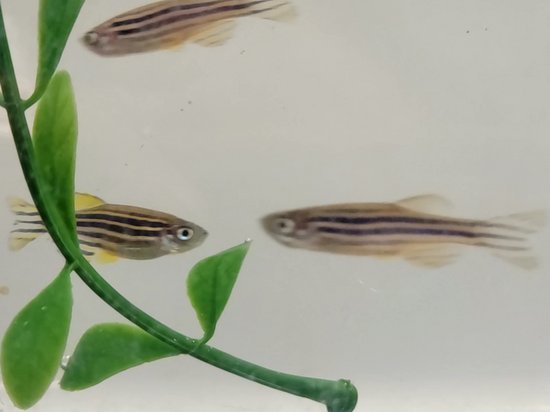Why do we sometimes find it easy to stay focused, while at other times we struggle? A new study by Florian Engert's lab at Harvard, Hanna Zwaka's research group at LIN and Armin Bahl's lab at the University of Konstanz shows how attention arises and what influences it. The researchers demonstrate that genes and the environment interact with each other in this process, albeit in different ways.
In the flow of attention
To better understand this, the researchers studied zebrafish as a model organism. The behaviour of these animals makes it possible to distinguish very precisely between internal and external influences. In their natural habitat, zebrafish swim against the existing current. In the laboratory, this behaviour was replicated using a moving pattern. Usually, the fish follow the stimulus, but not always.
Tired fish explore their environment less and are very focused on following the stimulus that gives them direction.
Hanna Zwaka wanted to know whether undemanding fish also exist among well-rested ones. To find out, Florian Engert's lab member Kumaresh Krishnan analysed existing research data in a new way. This revealed that the fish alternate between phases of alertness and phases of inattention. This was true regardless of whether they were well-rested or not.
Although this was not the initial focus of the research, it was so striking that Krishnan decided to pursue it further.
Attention is not a permanent state of mind
Just as we suddenly lose our train of thought while reading, fish also switch between focusing and becoming distracted. Kumaresh observed them closely in order to describe the moments when the animals focus their attention on a stimulus, and those when they do not. He collaborated with Armin Bahl from Konstanz to develop mathematical models.
They discovered two things:
- How often attention is activated.
- How well it works when it is there.
This distinction shows that genes influence whether attention arises. However, the environment determines how effectively we utilise it.
People who are fundamentally able to concentrate do not always respond equally well. It is the environment in which we grow up that makes the difference. Noise, a variety of stimuli, lack of sleep and stress can all impair performance, even if we have inherited the ability to pay attention. Therefore, while the environment does not determine whether we are attentive, it does determine how good we are at it.
Why is this important?
Attention plays a key role in our everyday lives, helping us to recognise dangers, make decisions and learn new things. Understanding how attention develops can help us to better understand why it is sometimes impaired, for example in ADHD.
This knowledge could lead to more targeted treatments and environments that support concentration in everyday life, at school and at work.
Small fish, big help
Zebrafish are particularly well suited to this area of research because their brains and nerve cells share many fundamental similarities with those of humans. For example, they are both vertebrates and use similar neurotransmitters, such as dopamine, serotonin and acetylcholine. Their brain structures are comparable to ours, but they are much smaller and transparent, allowing insights into the activity of living nerve cells. Genetically, many genes and signalling pathways are also very similar to those in humans.
As the basic mechanisms are similar, findings from zebrafish can easily be transferred to other animals and, ultimately, humans.
Redearch is team effort
This study is a collaboration between Florian Engert's team at Harvard University, Hanna Zwaka's team at LIN, and Armin Bahl's team at the University of Konstanz. They are all united by a curiosity about how attention arises and how this knowledge can transform our understanding of behaviour and learning.


